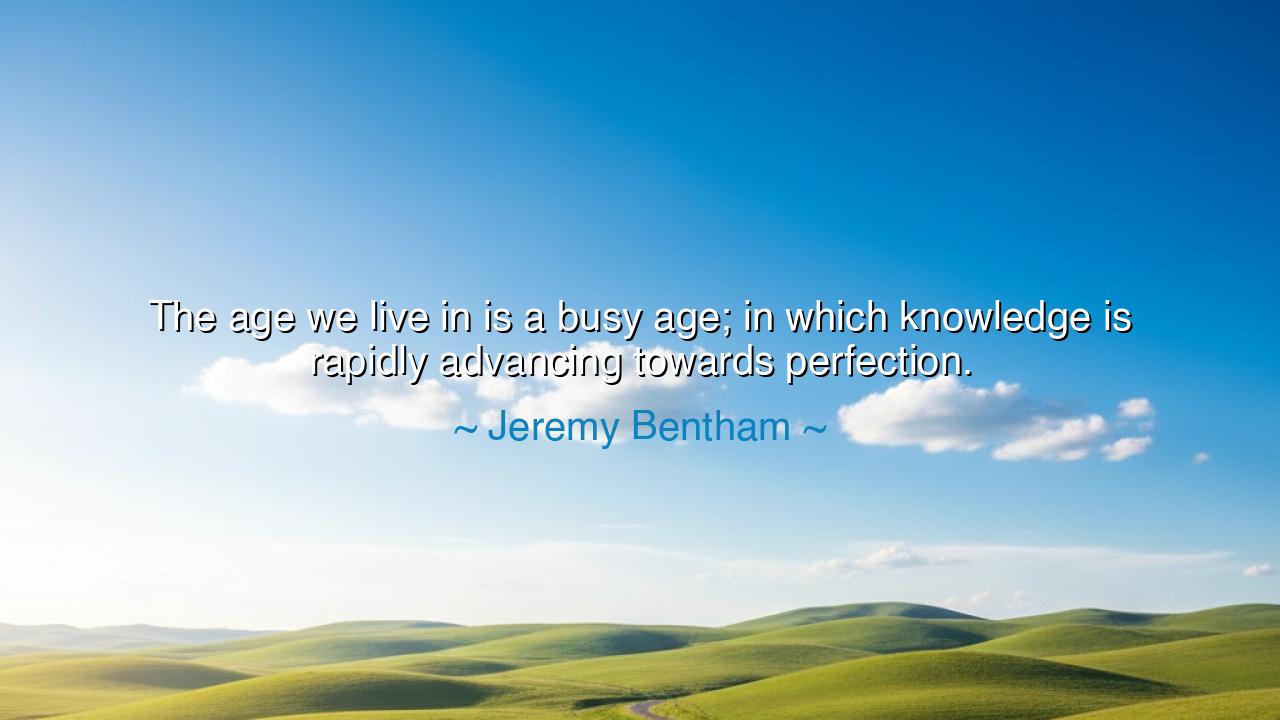
The age we live in is a busy age; in which knowledge is rapidly
The age we live in is a busy age; in which knowledge is rapidly advancing towards perfection.






In the grand sweep of history, each era carries its own defining qualities—its own spirit, its own drive. Jeremy Bentham, the great philosopher, speaks to this spirit in the words, "The age we live in is a busy age; in which knowledge is rapidly advancing towards perfection." This reflection speaks not just to the speed of progress, but to the energy that defines the time in which we live. We are in an age where knowledge, once slow and steady, now moves forward with great urgency and purpose—each day building upon the last, each discovery opening the door to new realms of understanding. In this busy age, the desire to learn, to grow, and to perfect our understanding is a force that drives us ever forward.
In the days of the ancients, the pursuit of knowledge was no less important, but it was far slower, more methodical. Plato and Aristotle did not have the vast systems of communication and education we have today. They were limited by the resources of their time, yet they sought to understand the nature of the universe, the soul, and justice. The ancient world was defined by thinkers who, through long years of reflection and dialogue, made slow but lasting advancements. They laid the foundation for science, philosophy, and politics—each discovery becoming part of the slow march toward greater wisdom. But the pace was deliberate, and many ideas took centuries to reach their full understanding.
Contrast this with the world Bentham described—a world where knowledge is not advancing at a crawl, but at a breakneck pace. Consider the Renaissance, that period in which the world was suddenly flooded with a new energy for learning. Leonardo da Vinci and Michelangelo did not just study the human form; they reshaped how we understand the world. Yet, even then, knowledge was still somewhat limited by the tools at their disposal, the methods of communication, and the reach of their ideas. However, the modern era that Bentham speaks of is one in which technology has erased the barriers of distance and time. The internet allows knowledge to travel at the speed of light, and scientific breakthroughs that once took years to achieve can now be disseminated across the globe in an instant.
Think of the impact of the printing press, an invention that transformed the spread of knowledge during the Renaissance. It is said that the first books, once produced in limited numbers, were suddenly available to anyone with access to the press, marking a revolution in how information spread. This invention laid the groundwork for the explosive growth of knowledge that we now witness. From that moment, information began to travel more swiftly, and it was no longer the preserve of a few, but available to the many. The printing press symbolized the beginning of the busy age that Bentham foresaw, where the floodgates of knowledge were opened, and humanity’s thirst for understanding could no longer be quenched at a slow pace.
But Bentham’s words also hint at a deeper truth: as knowledge advances, it seeks not only quantity but quality—towards perfection. The advances we now see in medicine, technology, and artificial intelligence are not just about gaining more information but about refining that knowledge. The pursuit of perfection in knowledge is seen in the work of Marie Curie, whose research on radioactivity not only advanced the understanding of the atom but revolutionized medicine, particularly in the development of cancer treatments. It is seen in the work of Alan Turing, whose genius laid the groundwork for modern computers and artificial intelligence, turning ideas once confined to fantasy into practical technologies that drive the modern world.
Yet, in this busy age, we must remember that knowledge alone is not enough. To achieve perfection is not to know everything, but to use knowledge wisely. Bentham’s insight serves as a warning as much as a celebration. Knowledge, if unbridled or misused, can lead to unintended consequences, as we see in the weapons of mass destruction, the misuse of technology, and the exploitation of the environment. Therefore, the lesson is clear: it is not enough to simply accumulate knowledge. We must pursue it with responsibility, wisdom, and a sense of purpose that benefits not just the few, but the whole of humanity.
The practical action for us, then, is to engage with the world of knowledge not only with passion and excitement, but with purpose. Let us take advantage of the tools at our disposal to learn, to innovate, and to build a world where knowledge does not just increase, but becomes a force for good. Let us not only advance the frontiers of science and understanding, but do so with a sense of moral responsibility, ensuring that the perfection of knowledge serves the betterment of all people. As Bentham wisely suggested, we live in a time of incredible opportunity, but we must navigate it wisely, for the ultimate goal is not just to accumulate knowledge, but to shape it into something that will help us all reach our fullest potential.






AAdministratorAdministrator
Welcome, honored guests. Please leave a comment, we will respond soon